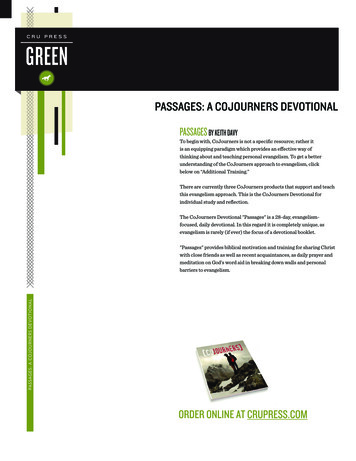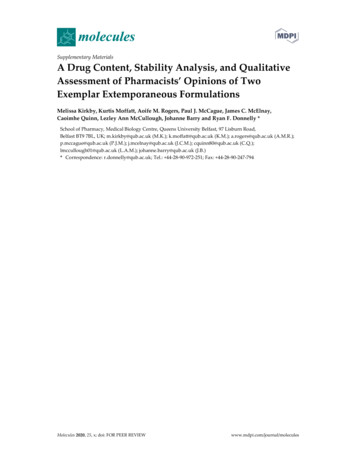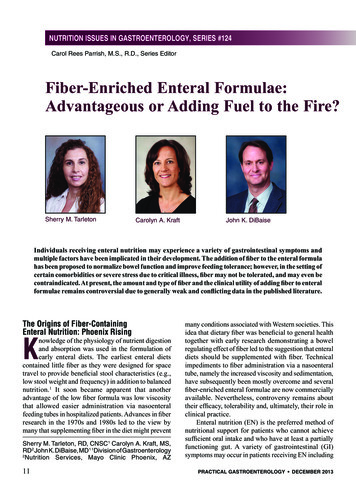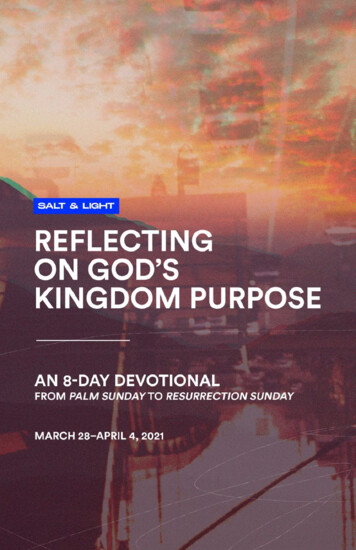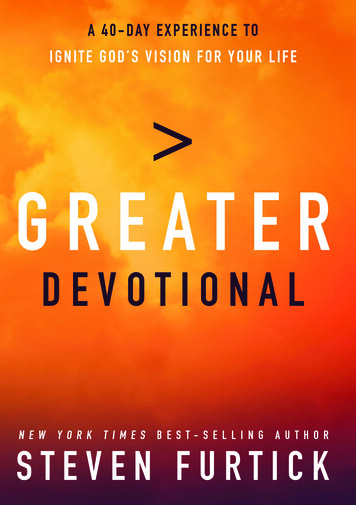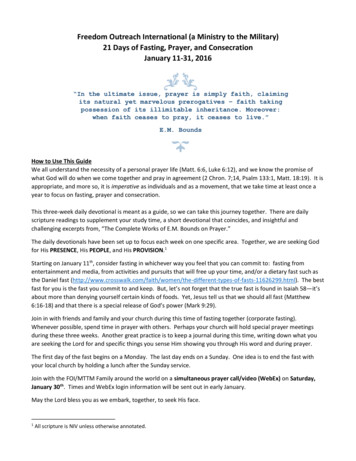
Transcription
REDISCOVERINGA PA S S I O NFOR GOD ANDTHE BIBLEThank you for sampling,A 31-DAY DEVOTIONAL EXPERIENCEWAKE UP: REDISCOVERING A PASSIONFOR GOD AND THE BIBLEAre you like a lot of Christians who feel like they’ve losttheir excitement for the Bible, or for pursuing God ingeneral? Guess what? It doesn’t have to be that way.“Wake Up: Rediscovering a Passion for God and theBible” is a 31-day devotional designed to help youlearn new and fulfilling ways of interacting with theBible. Wake Up will help you meet God in the Biblein ways you never have. And in doing so, yourpassion for God will be rekindled.If you have any questions aboutWAKE UP: REDISCOVERING A PASSIONFOR GOD AND THE BIBLE,please don’t hesitate to call usat 1 . 8 8 8 .9 6 9. 6 3 6 0 .ANDY BLANKSpublished by
INTRODUCTIONUSING THIS BOOKTABLE OF CONTENTStableofcontentsDAY 1: THE NAMES OF GOD, PART 1DAY 2: THE ART OF DEVOTIONAL READING, PART 1DAY 3: A DIFFERENT TAKE ON PRAYERDAY 4: MEDITATING ON WHO GOD IS, PART 1DAY 5: STORING UP GOD’S WORD IN YOUR HEARTDAY 6: DWELLING ON THE PROMISES OF GOD, PART 1DAY 7: THE DISCIPLINE OF FASTINGDAY 8: LEARNING FROM THE CHARACTERS OF THE BIBLE, PART 1DAY 9: REFLECTING ON GOD’S BLESSINGSDAY 10: FOCUSING ON THE THEMES OF THE BIBLEDAY 11: GOD’S WORD VISIBLEDAY 12: REMEMBERING GOD’S FAITHFULNESSDAY 13: UNLOCKING THE CREATIVE SIDE OF FAITHDAY 14: THE DISCIPLINE OF FASTING FROM MEDIADAY 15: EXPERIENCING THE EMOTIONS OF FAITHDAY 16: LISTENING TO GOD’S WORDDAY 17: MEDITATING ON WHO GOD IS, PART 2DAY 18: HAND WRITING SCRIPTUREDAY 19: THE NAMES OF GOD, PART 2DAY 20: FINDING JESUS IN PROPHECYDAY 21: THE DISCIPLINE OF SILENCEDAY 22: THE ART OF DEVOTIONAL READING, PART 2DAY 23: CONVICTION, CONFESSION, REPENTANCEDAY 24: UNLOCKING THE IMAGINATIVE SIDE OF FAITHDAY 25: DWELLING ON THE PROMISES OF GOD, PART 2DAY 26: THE DOING OF GOD’S WORDDAY 27: LEARNING FROM THE CHARACTERS OF THE BIBLE, PART 2DAY 28: PRACTICING EXPECTANCYDAY 29: THE NAMES OF GOD, PART 3DAY 30: ENGAGING WITH GOD’S WORD THROUGH SONGDAY 31: PRAYING THE PRAYERS OF THE BIBLECLOSINGABOUT THE AUTHOR
INTRODUCTION“O GOD, YOU ARE MY GOD; EARNESTLY I SEEK YOU; MY SOUL THIRSTS FOR YOU; MYFLESH FAINTS FOR YOU, AS IN A DRY AND WEARY LAND WHERE THERE IS NO WATER.”- PSALM 63:1Can you say this?Can you read these words and honestly say that they represent your truefeelings about your desire to know God?If you can, if you can say that David’s words here describe your day-in, dayout feelings and practices toward knowing God, you probably don’t needthis book. Oh, this book would be beneficial to you, for sure. Or at least Icertainly pray that it would be. But if you find yourself with a longing andthirst for God that leads you to seek Him earnestly each day, the angle thisbook takes may not hit you as squarely as it will others.Because here’s the deal: I can’t read that verse and say that it has alwaysdescribed my feelings or actions when it comes to seeking to know God more.Scandalous, right? After all, I’ve given my life and vocation to ministry. I’vebeen to seminary. I’m an author and a speaker. I have taught the Bible9
to teenagers and adults alike vocationally for the nearly two decades. Ifanyone should have the whole “thirsting for God” thing down it should besomeone like me.is not distant. If you have been born again through a saving faith in JesusChrist, God is literally with you, within you, every moment of your life (Rom.8:8-11). It is impossible for God to be any nearer to you.How is it possible that I can’t always see myself in the words of this verse?And yet, there are periods in our lives when God indeed does feel distant.What do we make of this? The unfortunate truth is that when God feelsdistant from us, the root of the problem is not with God, but with us. If Godfeels far away, we must look within ourselves for what is causing the distance.I share this with you to encourage you, knowing that on the outset it may feellike anything but an encouragement.To be sure, there are times in my life when I can relate to the verse. Thereare seasons when I feel like God’s Spirit is right under my skin, compelling meand propelling me to soak up as much of Him as I can. In these moments orperiods of time, I can barely contain the feeling of wanting to be with God.These seasons impact my purpose, my creativity, my teaching, my parenting,and my marriage. These are great times.But there are also seasons when I read the verse above and it is condemning.It reminds me of how far away I can feel from God.THE DISTANCE BETWEEN GOD AND YOUThe reasons we feel distant from God are myriad. Some of it is cultural. Thelives many of us choose to live have very little space for God. We are bookedsolid. Our pace is frantic. And when we have those little snippets of downtimethat could be spent snatching moments of communion with God, we’re facedown in a smartphone playing a game, browsing SB Nation or Reddit, orcatching up on Instagram or Twitter.Much of why we feel distant from God is spiritual. Scripture makes it clearthat all of us are born with a sin nature (Rom. 3:23). We are naturally inclinedto seek “self” and not God. Often we don’t seek God because we won’t seekGod. The words of my favorite hymn, “Come Thou Fount of Every Blessing,”come to mind:And yet, be encouraged. God is not far from you. He is never far from you.If this is true, it means that it is possible to feel close to Him again. There isgreat hope here.There is a wonderful promise in the New Testament, one I have clung to attimes throughout my life. It is the foundational premise behind the writing ofthis little book. James 4:8 says, “Draw near to God, and he will draw nearto you.” Maybe you need to read that again. Read it 100 times if you needto. Do whatever you need to do in order for this powerful truth to take holdof your heart and mind. God is near. He is never not near. If you draw nearto Him, He will reward your steps of faith, and He will remind you of Hisnearness.If you feel far from God and take action to feel closer to Him, God’s veryWord promises us that you will feel God’s nearness once again. Surely thereare more comforting promises in Scripture, but there have been times in mylife when this promise has sustained me like few others. Maybe this truth isa life preserver tossed to you in the midst of a stormy sea. However, thereremains a question. We know that God will honor our efforts to draw closerto Him, but what does drawing closer to Him look like? How do we do it?“Prone to wander, Lord, I feel it, / Prone to leave the God I love.”For whatever reason, many of us will go through times in our lives when Godsimply feels far away. We don’t sense His presence. He doesn’t feel near. Wesee the way other people talk about their faith, and it seems as if they aredescribing an entirely separate journey than the one we’re on. If this describesan experience you’re familiar with, let me speak some encouragement to youfor a moment.Here is a foundational truth, a life-changing statement: God is always near.He is never not near. God’s nearness to you is intertwined with His verycharacter. His presence in the lives of His children is a theological fact. God10THE WAY BACK TO GODIf you are like many people, you desire to know God more and better, to feelan intimacy with God, a passion for Him. But if you are honest, you don’t feellike your tried-and-true methods of seeking God produce these feelings. It’sOK to admit it. I believe many people find themselves here.As Christ-followers, much of our lack of passion for seeking God is practical.For many of us, it boils down to this: we really don’t know HOW to seek God.Read that last sentence again. It’s important. What I am proposing here11
is not a lack of desire, but a lack of expertise. That may sound crass oroversimplified. We like to think that we know all we need to know to seekafter God, especially those of us who have grown up in church or who havebeen Christians for a long time. We have a sort of instinctual understandingof what it means to read our Bible and pray. But I have come to believe thatthe average Christian has never been adequately taught more than one ortwo ways to interact with the Bible. And it shows.Study after study shows us a disappointing truth: American Christians live theirlives largely separated from God’s Word. The majority of Christians in the USdon’t read their Bible very much. Whether it’s Barna, or Lifeway Research, orthe American Bible Society, or others, the findings all paint a similar picture.Barna looked at the habits of all American adults and found that over 50%report reading their Bibles only three or four times a year. Only 14% of adultsreport reading their Bibles daily. Lifeway Research surveyed Christian adults,asking how many times they read their Bibles outside of church. Only 20%reported that they read it daily, while another 20% reported that they neverread their Bible outside of church.As a people, we are trying to live as Christians yet we are disconnected fromthe God-given source of what it means to live as a Christian.I find myself asking why this is the case. I believe most Christians WANT tolive in connection with God through His Word. But at the same time, I believemost Christians don’t really have a grasp of how to read the Bible in a waythat unlocks an emotional or even a personal engagement with God. Mostof us have simply never been taught, and so it’s easy for us to neglect theprimary way that God chooses to relate to us: His Word.What do I mean when I say that we have never been taught how to read theBible in a way that speaks to our emotional engagement with God? Let meexplain. Most people have only ever been taught to interact with the Biblein one way, a way that in laymen’s terms we might call “Bible Study.” Thisis where you read a specific passage of Scripture and begin some level oftextual analysis. The primary goal is what we might call “understanding.” Wewant to know what a particular passage says. And so, we read for generalknowledge. Depending on the resources we have at hand or our level ofexpertise, we may do some level of historical or contextual analysis. We maylook at the original language to gauge a shade of deeper meaning or intent.If we’re good at Bible Study, we take the knowledge we accumulate (the“what”) and we seek to ask how it applies to our lives (the “why”). All in all,it’s a rather academic exercise.Now let me be clear: there’s nothing wrong with this. Textual analysis on this12level is useful, beneficial, and necessary. We need to know what God says.We need to be able, in the words of Paul, to “rightly divide” Scripture. Weneed to know how to apply the teachings of the Bible to our lives. Studyingthe Bible in this way is a good thing. It’s just not the only thing.If we’re honest, engaging with the Bible in the manner I just described doesn’talways satisfy the longing of our soul. When God feels distant, when we’respiritually or emotionally tired, when we need to rediscover our passion,excitement, or joy for God, it’s important to know that there are ways ofinteracting with God’s Word that feed our emotional and spiritual needs. Butso many people don’t know how to do this.I want to change this.I believe that the key to rediscovering your joy for God comes throughrediscovering, or discovering for the first time, your joy for meeting Him in thepages of His Word. You see, the Bible is the primary way we meet with God.It’s where we see Him giving us all that He believes we need to know aboutHim and His ways.In this book, I want to teach you how to interact with your Bible in ways thatwill lead you to pursue God more and more. I want to help you see thatreading the Bible doesn’t have to be boring, dry, or academic. And morethan anything, through approaching the Bible in ways that maybe you neverhave before, I want to help you rediscover your passion for God. That’s mypurpose in writing this book. I want to equip you to partner with the HolySpirit to awaken your deep joy for God and for His Word.Throughout Scripture, in the Old and New Testaments alike, when God isabout to do something in the lives of His people, there is a cry to come awake.“Awake, awake, put on your strength, O Zion; put on your beautifulgarments, O Jerusalem, the holy city; for there shall no more comeinto you the uncircumcised and the unclean.” - Isaiah 52:1“Arise, shine, for your light has come, and the glory of the LORD hasrisen upon you.” - Isaiah 60:1“But for you who fear my name, the sun of righteousness shall risewith healing in its wings. You shall go out leaping like calves fromthe stall.” - Malachi 4:2“Besides this you know the time, that the hour has come for you towake from sleep. For salvation is nearer to us now than when we first13
believed.” - Romans 13:11“For anything that becomes visible is light. Therefore it says, ‘Awake,O sleeper, and arise from the dead, and Christ will shine on you.’”- Ephesians 5:14My prayer for you as you start this journey is that your soul would awaken.God is near you. He is always near you, if you can but see it.Maybe you are in a dark season when more than anything you crave God’spresence in your life.Maybe you find yourself simply longing for a fresh approach to encounteringGod in His Word.Regardless, my prayer is that the practices in this book will ring like a bellin your life, awakening you to a renewed love and joy for God and for whoHe is in your life.1415
You will be prompted in many ways throughout this book to write thingsdown. I would encourage you to get a journal or a notebook to do it.HOW TO USE THIS BOOKFirst, this book is designed to be read over the course of a month. Some ofyou will work through this book in exactly 31 days. You are most likely thepeople who also organize their sock drawer by color. I am not making fun ofyou. You are amazing, and I am thankful for you even if it’s solely becauseyou serve as a hopeful reminder, amidst trying to manage the schedules offour children and two working parents, that there is indeed order in this world.Most of you will need more than 31 days to go through this book. This is OK.Take your time. Go at your own pace. The important thing is to stick with iteven when you don’t feel like it. That’s one of the wins in a book like this. Ifyou’ve been struggling to meet with God on a regular basis and are makinga commitment to do so, God will honor you. He is faithful. He will meet youwhere you are. Along the way you will find a new joy for meeting God in thepages of the Bible that you may never have experienced before.Many of you will find that this book actually provides you with well over a monthof content. Some of the experiences in this book are repeatable approaches toengaging with the Bible that can be applied to almost any passage of Scripture. Ifone of these approaches proves especially meaningful, you may choose to applyit to other passages of Scripture not suggested by this book. Additionally, many ofthe Bible Study experiences contained in this book offer several options to choosefrom within that specific day’s content. If you find that you really connect witha specific activity and that activity has a few different options, you may want tocome back to that day’s devotion and work through the options at your leisure.Next, I would strongly encourage you to have a journal handy. I know thatKindle and other e-readers have note-taking capabilities. And I know thatEvernote and similar tools are wonderful tools for jotting down your thoughts.I love technology. But I am a firm believer that the act of writing is a keycomponent of spiritual growth. The tactile practice of writing down yourthoughts forces you to slow down a bit and process information differently.16Finally, while I put a lot of thought into the progression of the various days inthis book, and while I do believe that the optimal way of utilizing this book isto start on Day 1 and read in order through Day 31, you definitely don’t have todo this. You can peruse the table of contents and pick specific days that lookthe most intriguing to you and do them in the order you choose. That’s definitelyan option available to you. If you choose to do this, let me ask you two favors: First, you’ll notice Days 7, 14, 21 and 28 are slightly different days.These days are more action oriented and are designed almost asa Sabbath of sorts from the other devotions. If you are going toread the book out of the suggested order (which is, again, fine todo), I would strongly encourage you to make it a point to do thesedays on the suggested timeline. (In other words, on your seventhday of reading, read Day 7, no matter what order you have readDays 1 through 6. Do the same with Days 14, 21, and 28.) Second, if you bounce around, commit yourself to reading each ofthe 31 days. You’re reading this book because you have a desireto reconnect with God through His Word. The very premiseof this book is that there are exciting ways of connectingwith God through the Bible that you may very well be unawareof. If you only cherry pick days with titles that appeal to you, youwill most likely miss out on a new way of meeting God in His Wordthat could very well be just the thing to inspire a more personalinteraction with God.There will no doubt be days in this book that hit you better than others. I havetried every single one of the methods I propose in these pages. Some movedme greatly. Others not so much. But each of them is valuable in its own right.You never know how God will choose to speak to you. Be brave. Be openminded. Give every day in this book the chance to make its mark in your life.As you prepare to jump in to Day 1, I want you to know that I am mindful of you.I do not know you. But this book was written prayerfully with you in mind. Thereis nothing special about this book. It is merely a resource that points to THE Book.My prayer is that over the next 31 days or so, you will experience God andHis Word in new ways and that through this you will awaken inside of you arenewed joy for God.Now, let’s get started.17
THE NAMES OF GOD, PART 1Do you know what your name means? I’d bet most people do. (In case youwere wondering, my name, Andrew, means “strong and manly.” I’m just tossingthat out there.) The better question is whether your parents named you whatthey did because of its meaning or because of another reason. Maybe youshare a name with a family member, or maybe your parents just liked thesound of your name. Whatever the reason, your name has come to meansomething very specific. When someone close to you hears your name spoken,they immediately associate your name with the person you have come to be.Your name tells people who you are. Your name has a certain meaning thathas been established by the life you have lived.It is no different with God’s name. Interacting with God through the names Heis given in Scripture is a powerful way to draw closer to God and to rediscoverour passion for Him.Today we’re going to start with one of my favorite ways of interacting withScripture to engage with God. I’ve found great benefit personally in this activityand have led others to find meaning in it as well. We’re going to focus our timeof Bible reading by interacting with some of the different names of God.THE NAMES OF GODPA RT 118One of the beautiful things about the Hebrew culture we see in the OldTestament is its rich use of names for God. The Hebrew authors used differentnames for God to describe the many different roles He played in their lives.For instance, in Judges 6:23-24, God came to Gideon in peace. And so, Gideonbuilt an altar to God and named it “The LORD Is Peace,” or in Hebrew,“Jehovah Shalom.” The cool thing is that God’s nature is unchanging, and soHe still plays these roles in our lives today.As we seek to rediscover our passion for seeking out God through engaging withthe Bible, contemplating the names of God is a powerful and meaningful practice.19
THE NAMES OF GOD, PART 1In a moment, you’ll encounter several names for God used by His people in theOld Testament. This grouping of names builds off the Hebrew word YAHWEH, thename God gave Abraham when God was initiating His covenant. These namescombine God’s name with some of His attributes. The English translation of YAHWEH is “Jehovah.” And so you’ll see God’s name, Jehovah, paired with one of Hisattributes.HERE’S YOUR CHALLENGE FOR TODAY:FIRST, set aside a time to read over this list. Pray so that you may get yourmind and spirit in a reflective, peaceful state, preferably free from distractions.THEN, read through the list a couple of times.NEXT, choose one of the names of God from the list below that makes animpact on you. This could be a role God has fulfilled in your life in the past,or it could be a role He is playing now. Then, read the Bible verses where thatname is mentioned and reflect on that aspect of who God is.Here’s a list of a few of the names of God:Jehovah-Jireh: “The LORD will provide.” This was the name used in conjunctionwith God providing a ram for Abraham to sacrifice in the place of Isaac. Thisname is a testimony to God’s deliverance. Read Psalm 73:21-26. Consider: How has God provided for you in times of trial? How is Heproviding for you now?Jehovah-Nissi: “The LORD is my banner.” Moses ascribed this name to Godafter a victory over the Amalekites. The name of God was considered abanner under which Israel could rally for victory. The Lord’s name was thebattle cry. Read Proverbs 2:1-8. Consider: How has God provided you victory in some area of yourlife? Where do you need that victory today?Gideon built at Ophrah signifying that God brings well-being, not death, toHis people. Read Psalm 4:1-8. Consider: When has God been your peace in the past? Do you needHis peace today in some way?Jehovah-Rohi: “The LORD is my shepherd.” God is the One who providesloving care for His people. Read Psalm 23:1-6. Consider: What provision has God given you that you are mostespecially thankful for?Jehovah-Rapha: “Jehovah Who Heals.” Jehovah is the Great Physician whoheals the physical and emotional needs of His people. Read Psalm 103:1-5. Consider: How has God healed you in the past? What do you needhealing from today?Yahweh-Mekaddesh: “The LORD sanctifies.” Holiness is the central revelationof God’s character. God calls for a people who are set apart from the worldto be used for His purposes. Read Psalm 40:1-3. Consider: Express your thanks to God that you’ve been set apart byGod, cleansed of your sin, and made to be His child.Yahweh-Sabaoth: “The LORD of Hosts.” This can also be translated “theLORD Almighty.” It represents God’s power over the nations. The title sees Godas King and Ruler of Israel, its armies, its temple, and of the entire universe. Read Psalm 66:1-7. Consider: How do you see God’s power displayed in the worldaround you? In your life?FINALLY, pray to God using that specific name. (It’s OK if you don’t pronounceit perfectly! God knows what you mean.) Thank God for realizing this role foryou. Or, ask Him to help you see Him in this role.The most important thing is keeping this concept in front of you throughoutthe day. As you can, reflect on this name. Consider writing it on your hand oron a note card. Do whatever you can think of to remember to focus on thisname and how God relates to you in this way.Jehovah-Shalom: “The LORD is peace.” This was the name of the altar that2021
THE ART OF DEVOTIONAL READING, PART 2I could barely hear my phone ringing. My beloved Auburn Tigers had justfinished knocking off the second #1 ranked team in as many weeks. Whatmade this victory more special was that this was the Iron Bowl. We hadjust beaten Alabama in a game that was never really in doubt. The clockwas winding down. Soon the fans would rush the field. My wife and I werescreaming and cheering along with nearly 90,000 other Auburn fans. I felt myphone vibrating and I saw that my mom was calling me.I answered the phone knowing that I couldn’t hear a word she was saying,and as I suspected, I couldn’t. But I knew she would be screaming as loudas I was, and so I screamed back and let her hear the roar of the JordanHare crowd for a moment. I hung up the phone and laughed. I could barelyhear my wife next to me, much less my mom on the phone. It was simply toomuch noise.Sometimes the distance we feel between us and God is caused by thenoisiness of our lives. We have so much going on that even when we try toconnect with God, we can’t always hear Him over the “noise” we surroundourselves with. This devotion aims to help teach us how to pursue God byquieting the noise in our lives.THE ART OF DEVOTIONAL READINGPA RT 222Today’s time of encountering God in the Bible embraces one of my personalfavorite methods of engaging with Scripture. It’s an ancient practice thatcomes from a time when most people in the Church were illiterate andrelied on hearing the Word. I have found that as much as any one way ofinteracting with the Bible, this method speaks to my heart. Furthermore, forme personally, I seem to be able to latch on to truths learned using thismethod. The echo of God’s words stays with me longer if I can make the timeto practice this approach.23
THE ART OF DEVOTIONAL READING, PART 2The fancy Latin phrase for this way of reading the Bible is “lectio divina.” (Try towork the phrase into a random conversation today to impress your friends.) It isdevotional reading, an experiential, heart-driven way of meeting God in the Word.When we read the Bible in this way, we’re not trying to do anything particularlyscholarly. We’re not taking an exegetical approach (a critical interpretation ofa text). The sole point of devotional reading is to foster a relational, intimateinteraction with God through the text. It asks the question, “What does Godwant to show me in this text?”If you’ve never engaged with the Bible in this manner, if you’re thinking it soundstoo emotional or mushy for you, I’d ask that you give it one chance. If you reallypour yourself into it, I promise you will be moved by what you get out of it.HERE’S YOUR CHALLENGE FOR TODAY:FIRST, find somewhere quiet. Quiet your mind. Prepare your heart. Slow down.Get yourself ready to meet God in His Word. Start with a prayer to God,asking Him to reveal to you what He has for you in this passage.THEN, read the passage. You can use the one I have included below orchoose your own. Read it slowly, almost word by word. The idea is to read asif God is going to stop you and show you something at any moment. As youcome across words or phrases that seem to speak to you, pause and focuson them. Think about what it is about them that speaks to you. But most ofall, listen to what the Spirit is trying to show you.FINALLY, summarize to yourself what you have learned. Some people like tojot these thoughts down in a journal. Some can do this mentally. But the ideais to spend some time — however much you spend is up to you — just thinkingabout what God has showed you and how it changes who you are. Try tohone in on specific concepts that you can take away.I’d like to challenge you to give this method an honest try, even if it feels newor a little unusual. The passage I’ve chosen for you to read today is Romans8:31-39. Go ahead and jump in to this time of devotional reading.“[31] What then shall we say to these things? If God is for us, who canbe against us? [32] He who did not spare his own Son but gave himup for us all, how will he not also with him graciously give us allthings? [33] Who shall bring any charge against God’s elect? It is Godwho justifies. [34] Who is to condemn? Christ Jesus is the one whodied—more than that, who was raised—who is at the right handof God, who indeed is interceding for us. [35] Who shall separate usfrom the love of Christ? Shall tribulation, or distress, or persecution,or famine, or nakedness, or danger, or sword? [36] As it is written, ‘Foryour sake we are being killed all the day long; we are regardedas sheep to be slaughtered.’ [37] No, in all these things we are morethan conquerors through him who loved us. [38] For I am sure thatneither death nor life, nor angels nor rulers, nor things present northings to come, nor powers, [39] nor height nor depth, nor anythingelse in all creation, will be able to separate us from the love of Godin Christ Jesus our Lord.” — Romans 8:31-39NEXT, contemplate the passage even deeper by reading it one more time,but this time, read it out loud. (This might feel strange at first, but it’s animportant part of processing the passage in a way that allows you to pick upon different cues rather than simply reading it to yourself.) This time, really soakin the words and ideas you’re encountering. If God is wanting you to think oncertain principles, do so. Allow the words to guide your interaction with God.THEN, you need to consider your response. This is your chance to engage in aconversation with God. Pray to Him, asking Him what He wants to show you.Express to Him how the truths He led you to reflect on made you feel.2425
A DIFFERENT TAKE ON PRAYERPrayer is the language of our relationship with God, but for many of us, ourprayer lives are often lacking passion or feeling. We pray to God and maybewe thank Him for the blessings He has given us. Maybe we remember to prayfor the needs of others. But if we’re honest, many of us are all too quick to prayfor our own needs and the things that concern us most. None of this is wrongin itself. But too often, we don’t approach God with the passion that He desiresus to approach Him with.Have you ever felt like your prayers bounce off the ceiling? Like they don’teven make it to God? If you do, you’re not alone. I believe many people findprayer to be something they struggle to know how to fully engage in, andyet, meaningful prayer to God is oftentimes linked to encountering Him in HisWord. When we can see God clearly in the Bible, we should be moved tospeak to Him in ways that
day 2: the art of devotional reading, part 1 day 3: a different take on prayer day 4: meditating on who god is, part 1 day 5: storing up god’s word in your heart day 6: dwelling on the promises of god, part 1 day 7: the discipline of fasting day 8: learning from the characters
